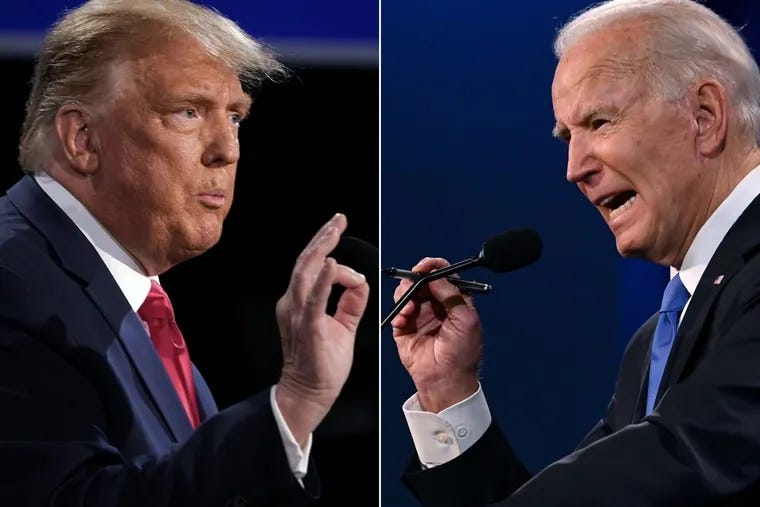Democrats are Setting the Terms of the Debate
Republicans offer no pragmatic policy ideas. Democrats are happy to fill the void by making the election about their own accomplishments vs. the GOP's devotion to Donald Trump.

Labor Day has passed marking the start of the critical two-month stretch to the November elections. At this point in most cycles, serious parties have presented Americans with their platforms and agenda items to attract new voters, rally the base, and set national priorities.
After months of dawdling and setbacks, President Biden and Democrats are now running full steam ahead on an impressive list of accomplishments including: emergency aid to preserve American jobs and businesses during the pandemic; new infrastructure investments; support for domestic manufacturing; R&D funding; expansion of veterans’ health care services; cheaper prescription drugs and insulin caps for seniors; and clean energy projects. They are directly confronting Trump and his GOP defenders over the former president’s ongoing election lies and his support for the attacks on the U.S. Capitol. They are highlighting the radical actions of the Supreme Court in overturning Roe and GOP states pursuing extreme abortion bans.
In contrast, do Republicans have ANY pragmatic policies they are promoting this election cycle? Voters will have to dig deep to discover something concrete. Scroll through the pages of the NRSC, NRCC, and RNC websites and you’ll find very little about the GOP’s policy ideas. You will however find overpriced mugs and t-shirts lavishing praise on Donald Trump and hats that read, “Let’s Go Brandon.”
Politics ain’t beanbag as the saying goes. If Republicans refuse to offer voters a serious agenda, Democrats will gladly define the election on their own terms. Biden hasn’t lost his political instincts. He knows he can beat Trump in any head-to-head choice. Despite any misgivings Americans might have about the current president, a huge majority of voters reject everything about the former president.
The electoral limitations of a Trump-first, no-policy approach must be obvious to the leading lights in the Republican Party. Still, the GOP can’t or won’t help itself. It’s Trump all the time—just as the Democrats and Trump want it to be.
Republicans have elements of an overall policy agenda floating around. What is missing at this late stage in the election is some consensus about what to promote and recognition that many of the party’s greatest hits—like tax cuts for the wealthy and cuts to social programs—remain unpopular with Americans. So they are trying to fake it.
For example, House Minority Leader McCarthy’s website lists several policy ideas that vaguely sound like Democratic plans to fund this area and support that demographic group while simultaneously reducing the size and scope of government. Senate Minority Leader Mitch McConnell—despised by Trump—offers the old policy chestnut “repeal and replace Obamacare” that has failed with voters dozens of times.
Rick Scott, head of the Republican Senate campaign effort, presents a host of novel ideas in his “Rescue America” plan that few mainstream Republicans seem willing to run on or defend—things like “eliminate federal programs that can be done locally” and a requirement that “all federal legislation sunsets in 5 years,” including Medicare and Social Security. The rest of the list includes sentiments like “stopping Socialism” along with nods to Trump’s 2020 election lies and appeals to his ego by naming the southern border wall after him.
Far-right red states have a smorgasbord of policy ideas on offer to criminalize abortion. Yet even the most pro-life GOP candidates are scrubbing their campaigns to pretend they don’t support these radical restrictions on women's rights. Pro-Trump media outlets and candidates now want to “defund the FBI” after the former president was caught hoarding national secrets—a sure electoral winner.
The pattern across all levels of the Republican Party is the same: general policy disarray, few if any pragmatic alternatives to Democrats, and a basic unwillingness to confront the party’s most critical weakness and electoral liability, Donald Trump.
If you’re an on-the-fence voter, unhappy with Biden and Democrats and probably worried about the economy, does any of this sway you towards Republicans?
The GOP is betting that the party’s lack of an affirmative policy agenda won’t matter in November and that voter anger at Biden—plus weird Trump obsessions and conspiracies among the base—will drive midterm gains. This is Rick Scott’s theory of the case in his fight with Mitch McConnell over party strategy.
Political dynamics can change dramatically in two months. The Trump-first, no-policy approach might be enough to take the House narrowly and perhaps the Senate given the heavily polarized state of the American electorate and ongoing concerns about inflation. But this is quite a gamble in an election cycle where the party could see huge gains amid numerous Democratic shortcomings. If the GOP were remotely rational, it would stop taking the bait on Trump and at least turn its main grievances on the economy, crime, and immigration into some pragmatic ideas for voters in the ideological center.
Absent any clear policy alternative, Biden and Democrats will continue to define the fall election as a choice between Democrats supporting the middle class and extremist Republicans threatening individual rights.
In the end, this contrast may not be enough to protect both their House and Senate majorities—and it’s certainly not enough to fix Democrats’ long-term image problems. But given the negative political environment they’ve faced all year, Democrats will be more than happy to debate the elections on these terms.


